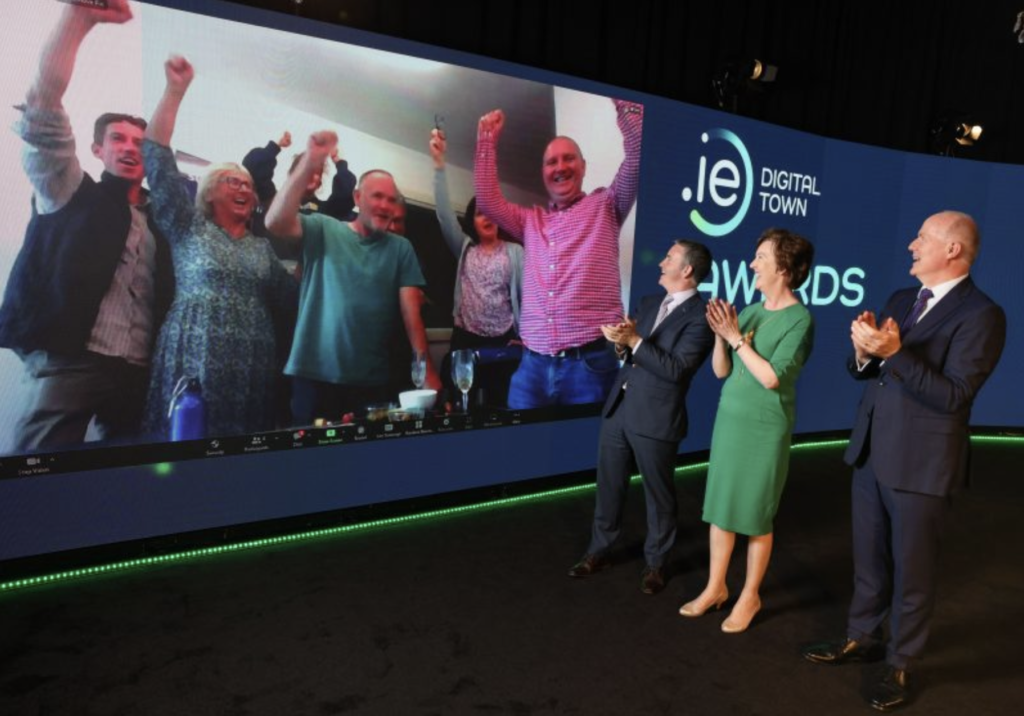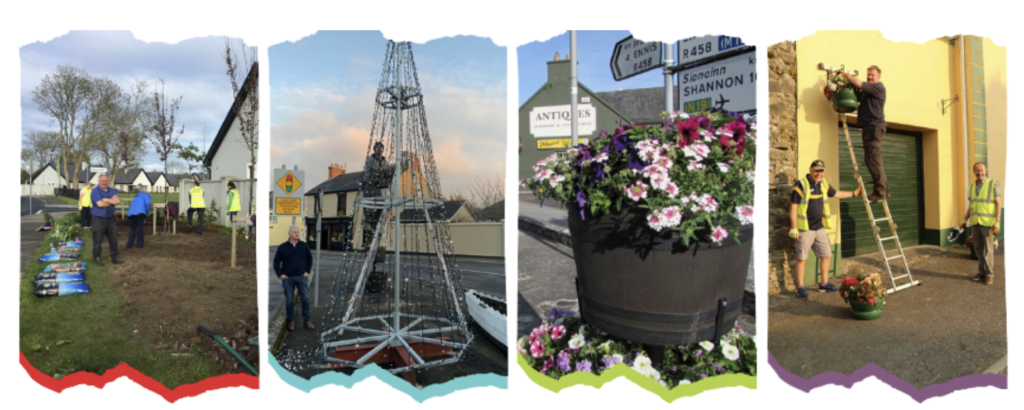By Dr Michelle Cowley-Cunningham and Antonia Egli (Dublin City University)
Rural development creates vibrant environments with improved economic opportunities for people to live and work. Digital technology empowers communities to develop and achieve more economic prosperity than previously possible. Digitally enabling marginalised towns and villages will afford opportunities to bridge the urban-rural gap, promoting a better quality of life for all.
Town Centre First Policy: Reimagining Ireland’s Towns and Villages
The Government of Ireland recognises the potential of digital technology and has set out a policy agenda to help rural Ireland capitalise on its benefits. The Town Centre First policy aims to help communities and businesses reimagine their own towns for a more prosperous future while emphasising digital technologies. Part of this policy stems from Our Rural Future, Rural Development Policy 2021-2025, detailing the Irish Government’s blueprint for the development of rural Ireland over the next five years. Proposing a long-term vision, the policy promotes economic activity that is reliant on, or is significantly enhanced by the use of digital technologies, digital infrastructure, digital services, and data.
Rural communities stand to gain much from this introduction and uptake of digital technology. Commercial benefits include: reductions in distance-related barriers, cost savings, operational efficiency, IT resilience, scalability, easier access to new markets, marketing effectiveness, enhanced and engaged customer service, and market and customer intelligence.
Resourcing each town to chart their own future with a bespoke plan, Town Centre First provides structure and funding for a collaborative and celebrated town team approach guided by a local authority. For example, the .ie Digital Town Awards, directed by .ie, the trusted Irish national registry for web domain names, reward exceptional efforts to implement creative digital solutions that positively enhance the lives of community citizens. As discussed by a previous MARGISTAR blog, these awards celebrate more than positive economic impact. The initiative showcases how digital education encourages inclusiveness via the promotion of citizenship values, readily enabling the expression of diverse points of view and open dialogue.

Developing Smart Villages: eTownz and EU Smart Rural 27
eTownz is the national coordinator of the EU’s Smart Rural 27 programme for the Republic of Ireland and works with 27 other national experts covering all EU countries. Smart Rural 27 is the follow-on programme of Smart Rural 21, and the objective of these programmes is to promote and inspire villages to develop and implement ‘smart village’ strategies. Their broader purpose is also to support future policy interventions on smart villages. Smart villages are communities in rural areas that use innovative approaches and solutions to improve their resilience, building on local strengths and opportunities.

eTownz guides community initiatives encouraging ‘smart’ development locally, regionally, and nationally. The initiative has a suite of connected services to enable the development of smart villages incorporating the e-Towns Community Planning Dashboard, community websites, and consultancy and training. In particular, the e-Towns Community Planning Dashboard offers support in planning, communication, management, and sharing feedback amongst entities engaged in (digital) development at local, regional, or national levels.
Engaging with communities as ‘tools of change,’ eTownz facilitates communities to better achieve digital transformation. For example, they work with the civil society volunteering groups and charities ‘As I Am’, ‘Tidy Towns’, and the national ‘Meals on Wheels Network’ to leverage local digital resources, engage community stakeholders regularly, and encourage clear communication digital presence.
Education towards Smart Villages: The eTownz Smart Villages Curriculum
Together with the Common Agricultural Policy (CAP) Network Ireland, eTownz has collaborated to produce a ‘Smart Village Curriculum’ to help rural communities adopt digital technologies. As a first effort in Europe, the eTownz training nurtures rural community project teams. The curriculum is available online and flexible in format, comprising 6 x 90-minute modules, and has produced a set of key deliverables including: a Smart Village Training Manual, a Smart Village Workbook, a set of Smart Village Module Presentations, and opportunities for self-assessment via the Smart Village Module Quizzes. Each module introduces a new topic, guiding participants through the process of creating a ‘Smart Village Plan’ for their area.
For example, attendees learn how to create and manage a community asset and stakeholder register to better identify future local community assets and coordinate them for projects. Concepts around the power of data to aid evidence-based decision making are introduced, alongside key digital tools to measure performance. Attendees learn about the connection between local development themes (e.g., tourism), goal setting, and specific actions. Finally, soft skills to enable volunteer team building and cross-community collaboration are inspired. Sustainability is aided by promoting an annual recurring programme building on experiences and shared responsibility amongst the community.
CAP Network Ireland is the National Network dedicated to supporting sustainable agriculture and rural development in Ireland. Their role is to promote networking, innovation and funding opportunities under Ireland’s CAP Strategic Plan.
The central objective is to enable rural communities to behave as smart villages. Smart villages know how to leverage local digital resources as part of local action plans, engage community stakeholders regularly, and possess clear communications to engage other rural communities. With the potential for regional outreach, the curriculum teaches learners to readily share their experience and know-how for collaboration with similar communities. Based on this repository of advice, a rural community will gain an increased understanding of how to:
- enable digital technology to best serve and future-proof their local population;
- engender community participation and team building;
- stimulate an interest in local development;
- implement strong governance processes;
- maintain transparent accounting procedures for good financial decision-making;
- establish processes and structures to support collaborative planning and working;
- make a community a better place to work, live, and play.
From Smart Villages to Smart Communities & Regions: Progress and Next Steps in Ireland
A recent Irish Smart Village Task Force meeting summarised the project to date and presented an overview of an EU Taskforce Observations themed report. Evaluating the policy context from stakeholder consultation research and collaborating with eTownz, the report engaged local communities, regional bodies, research bodies, national bodies, and thematic stakeholders over a six-month period. Respondents were asked to rate their agreement regarding smart village definitions/concepts, integration into smart regions, how to develop best practices, and the inclusion of marginalised groups. The report’s findings were recently presented on the EU conference circuit by eTownz in Brussels. The team was commended for their curriculum as the first of its kind in the EU, and they will release the full report soon.
The next steps and recommendations for Irish smart villages are:
- Create a taskforce to facilitate an ongoing Irish Smart Village Taskforce with CAP Network Ireland and eTownz support;
- Develop best practices across the country with case study portfolios, and accommodate connected themes of well-being, health, and biodiversity;
- Reach out to marginalised groups for better-informed implementation and planning processes.
The real need to examine the concept of smart villages was apparent. ‘Smart communities’ as a term was suggested to better describe ‘smart regions’ affording an integration and interoperability of planning frameworks. Ultimately, smart communities will be ones that actively seek to support the development of other smart towns and villages in the area to create smart regions. Inequities and perception issues with the definition of ‘village’ translates to an emerging preference for the term ‘smart communities.’ eTownz’ analysis of the corresponding EU policy definition proposes that the term ‘smart communities’ replaces ‘smart villages’, and that the term ‘rural areas’ is removed entirely. Prospecting into the future, ‘smart communities’ may speak better to dialogue around ‘smart regions’, but there also needs to be evidence-based thinking around building models/frameworks to achieve this goal.
CEO of eTownz, Pat Kennedy says “The Smart Village approach seeks to bring together local knowledge and digital tools to empower local communities.”
Learning from Smart Community Initiatives: MARGISTAR’s Task in Ireland
The next five years are potentially game-changing for those committed to maximising the benefits that digital innovation will bring. Irish towns and villages stand ready to represent the backbone of local, and often rural, communities and economies, supporting enterprise and generating employment opportunities. Certainly, the digital decade is a time of significant change, and some may say disruption, for Irish towns and villages. We’ve demonstrated through the implementation of Town Centre First, EU Smart Rural 27, and the new eTownz curriculum, that it also presents a time of substantial opportunity for communities who adopt, adapt, and evolve with digital enablement.
While overarching policies shape a country’s regulatory environment, community action reflects local priorities, needs, and dynamics. Monitoring changing policy and ongoing community action in a country is crucial for the success of MARGISTAR’s overall task in creating a repository of potential transformation pathways for the improvement of marginalised mountain regions. These pathways illustrate the move from real-world problems to post-marginalisation visions and is, within MARGISTAR, a main task of Working Group 2. The observations made from eTownz and CAP enhance the quality of MARGISTAR’s long-term research and align it with existing (and thus realistic) wins within the space.
The header image was taken by Luiz Filipe Evelin from Dublin City University.


